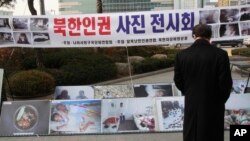North Korea's crimes against humanity are the biggest challenge facing the international community, said a South Korean envoy who described the violations as tantamount to genocide.
Speaking to VOA's Korean Service on Thursday in a phone interview, Lee Jung-hoon, the South Korean Foreign Ministry's ambassador for human rights in North Korea, said the first and foremost step in solving gross violations of human rights in the reclusive state is bringing the Kim Jong Un regime before the International Criminal Court (ICC). He urged the international community to ramp up efforts to bring Pyongyang to account.
2014 effort failed
In 2014, the U.N. General Assembly voted to refer the Kim regime to the ICC for crimes against humanity, but the resolution stalled in the U.N. Security Council. Beijing and Moscow, the council's members that are North Korea's longstanding allies, reportedly vetoed the measure.
"The international community should continue to pursue a referral of the situation in North Korea to the International Criminal Court by convincing China and Russia to bring forth the Security Council's full-on action to tackle the North Korean human rights issue," Lee said. "And when that referral takes place, I expect a tremendous progress."
Describing ongoing human rights abuses as "the worst criminal acts" under international law, Lee equated atrocities taking place in the North — torture, arbitrary detention, enslavement, forced labor and murder — with the Holocaust, a genocide in which roughly 6 million Jews were systematically killed by Nazi Germany during the World War II.
A damning 2014 U.N. Commission of Inquiry report detailing wide-ranging abuses in the North found that "The gravity, scale and nature of these violations reveal a state that does not have any parallel in the contemporary world."
The ambassador also recommended the establishment of an ad hoc international tribunal, similar to those employed to investigate genocide in Cambodia and the former Yugoslavia.
"In the case of the Cambodia Tribunal, the country's national judicial authority in conjunction with the United Nations set up a so-called hybrid court," Lee said of the institution used to try the Khmer Rouge for crimes perpetrated during the Cambodian genocide. "Such a court could also be installed as part of an effort to end the North Korean human rights crisis."
North Korea Freedom Week
The South Korean ambassador's comments came during North Korea Freedom Week in Washington, which has been held annually since 2004. The event brings together North Korea defectors who have resettled throughout Asia, Europe and the United States.
As part of the week's program, South Korea's Foreign Ministry organized the World Congress for North Korean Defectors in Washington on Thursday, where Lee called on defectors or victims of Pyongyang's behavior to unite and come to the forefront to hold the abusive and repressive state accountable.
The first World Congress for North Korean defectors was held in Brussels earlier this week, with 30 representatives in attendance, to discuss human rights violations in North Korea.
Also on Thursday, North Korea agreed to a visit by the U.N. expert on the human rights of people with disabilities, the United Nations said. The agreement comes after years of criticism of Pyongyang's record from the U.N. Human Rights Council.
Catalina Devandas-Aguilar will be the first independent expert designated by the council to visit North Korea, which has consistently denounced the council's resolutions as a conspiracy by the United States and other "hostile forces." She will visit North Korea from May 3-8.








